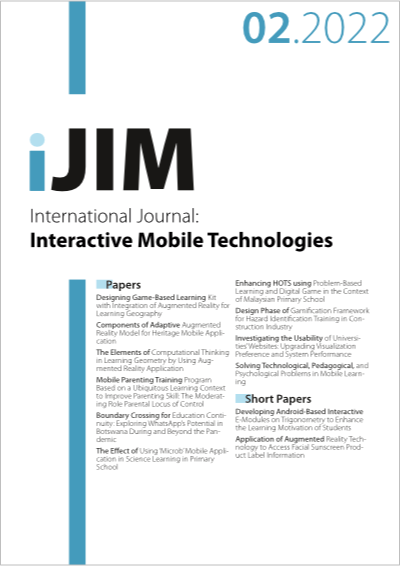The Elements of Computational Thinking in Learning Geometry by Using Augmented Reality Application
DOI:
https://doi.org/10.3991/ijim.v16i02.27295Keywords:
Augmented Reality, Computational Thinking Elements, Geometry, QualitativeAbstract
Augmented Reality (AR) technology has now become a growing trend within the education field. It has the capability to combine both digital and reality world that subsequently leads to the emergence of new possibilities in im-proving the quality of teaching and learning activities. The objective of this research is mainly to analyse the Computational thinking elements in solving Geometry topic after the intervention of AR application. Qualitative data analysis was employed as the research methodology of this study that in-volved interview protocol with 10 pupils enrolled in Form 1 Mathematics class at one of the selected schools in Johor Bahru, Malaysia. Content analy-sis was then administered using the ATLAS.Ti Version 8 software to identify the codes, themes, and meaning conveyed by the pupils’ answers in the Computational thinking test. Based on the interview and Computational thinking assessment show the pupils’ ability to solve Geometrical problems using Computational thinking elements. The researcher found that Computa-tional thinking elements do exist in problem solving pertaining to the topic of Geometry. However, the order of usage of these Computational thinking el-ements differs among the pupils. This leads to the conclusion that pupils who utilise the AR application with Computational thinking successfully solve Geometrical problems through the help of the Geometrical thinking process that comprises the elements of Abstraction, Generalisation, Decomposition, Algorithmic, and Debugging.
Downloads
Published
2022-01-28
How to Cite
Abdul Hanid, M. F., Mohamad Said, M. N. H., Yahaya, N., & Abdullah, Z. (2022). The Elements of Computational Thinking in Learning Geometry by Using Augmented Reality Application. International Journal of Interactive Mobile Technologies (iJIM), 16(02), pp. 28–41. https://doi.org/10.3991/ijim.v16i02.27295
Issue
Section
Papers
License
Copyright (c) 2021 MOHD FADZIL ABDUL HANID, MOHD NIHRA HARUZUAN MOHD SAID, NORAFFANDY YAHAYA, ZALEHA ABDULLAH

This work is licensed under a Creative Commons Attribution 4.0 International License.



